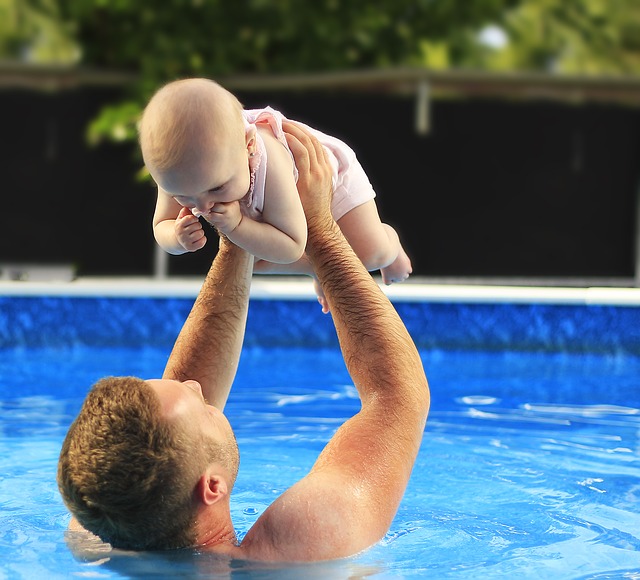Swimming can be a great activity for babies. Learning to swim is great for when your baby starts to grow up a bit to keep kids safe around water, and active. Swimming can be a fun activity for you and baby to enjoy together, and might be even more fun for babies who enjoy the water.

Introduce Baby To The Water
- Visit the pool early. Going in the morning means the pool is likely to be less busy, so you can have plenty of room in the pool to splash around, without worrying about crowds. Baby will also be better rested after a good night’s sleep.
- Be relaxed. Baby can pick up on your mood. If you’re enjoying yourself, they’ll feel like the water is fun too and relax enough to enjoy it.
- Introduce your baby to the water slowly, dipping their toes into the water first so they can get used to the feeling on their skin. If they seem to like it, drip more water on them, and slowly lower them into the water.
- In the pool, stay where you can stand up easily, and hold onto baby at all times.
- Make the water fun. Take a toy or play games. Hold baby under the arms and gently sway them through the water at different speeds to see how they enjoy moving through water.
- If your baby seems to be upset by the water, get out immediately. If you want their experience to be positive, so don’t force the baby to stay in the water if they’re not happy.
Baby Swim Classes
Swim classes are a great way to get your little one to start enjoying the water in a safe way. Most pools offer classes for babies over 6 months old. Be prepared before you go so you know what to expect to help your baby enjoy the water safely.
- In their first lessons, baby will get used to being in the water. Next, they’ll learn some basic skills such as kicking, bubble blowing, pulling with their arms and getting their face wet. Later comes dunking, and then when your little one reaches three or four, they’ll be ready to swim.
- It might some counter intuitive, but don’t dress your baby in a life jacket during the lessons. You want to teach your little one what it’s like to be in the water without a flotation aid. A vest also puts baby in a vertical position, which isn’t natural to swimming.
- Look for smaller group lessons so the instructor can focus properly on each baby. You want a relaxed, fun atmosphere with a flexible pace of learning. Your instructor should be nationally certified, so check before you join a class.
Getting into the water early is great for baby, and will help them feel happy and confident in the water when they’re older. Check with your pediatrician before starting, but babies can begin to enjoy the water when they’re still very young.
